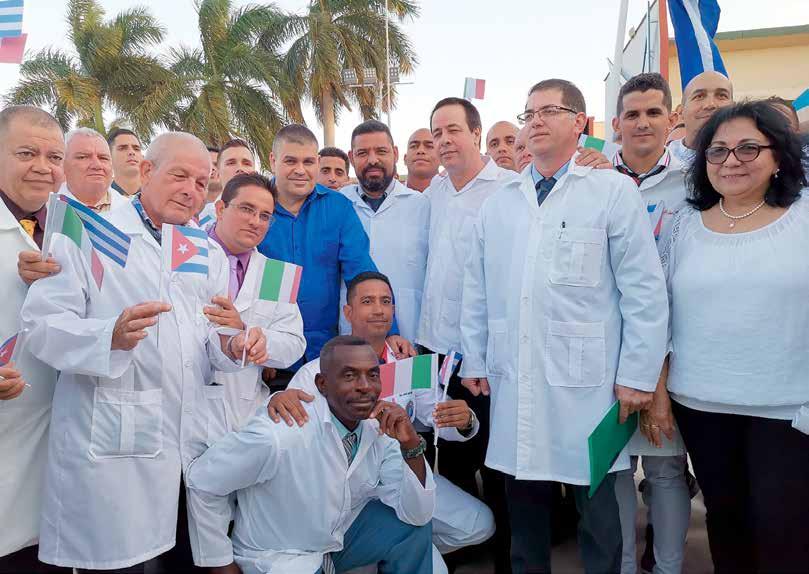
4 minute read
Health ministry develops Covid-19 mass testing strategy
By Olivia Rose
A COMPREHENSIVE Covid-19 testing strategy which includes the establishment of a laboratory facility in Grand Turk has been developed.
Advertisement
The detailed document also lays plans for antibody testing and partnership between the Government and the private health sector.
This comes as the Ministry of Health gears up to roll out widespread testing for the coronavirus in the Turks and Caicos Islands.
Minister of Health Hon. Edwin Astwood announced the strategy during his ministerial statement in the House of Assembly on Friday, May 29.
He said the Public Health Team has already collected samples to test before the official in-country testing begins.
“On May 26, the lab analysed eight patient samples with a known positive to validate the run, and it resulted in the run being successful and indicated that we were moving in the right direction.
“These test runs were still regarded as trial runs.”
The health minister revealed that an estimate of how much it will cost the Government to conduct community-based testing will be submitted to Cabinet soon for approval.
The territory acquired its first polymerase chain reaction (PCR) machine - a leading edge device used to test for the disease – at the end of April.
Since then, painstaking work has been ongoing to ensure testing is done in accordance with international benchmarks, the minister said.
“The National Public Health Laboratory has been working tirelessly to complete the verification process for performing the PCR test.”
Astwood explained that public health is now in possession of four PCR analysers, two Mic PCR analysers, one thermocyclin analyser and one GenExpert PCR analyser.
He said the recommended verification process has three aspects - one focuses mostly on the scientist and the analytical phase, excluding the amplification, and the remaining two primarily on the analyser and amplification.
“A full verification includes a day-to-day precision which is performed over a period of three days.
“On completion of all three steps, the technologists found that they needed to repeat the last step, which they have now done, because the results of the confirmed samples did not meet the acceptance criteria.
“The acceptance criteria are one standard deviation or one cycle,” he added.
It was due to these critical requirements that in-country testing has been delayed, the minister stressed.
“If the technologists tell the minister that the verification process has to be repeated, hence increasingthe time before in-country testing commence, how does that constitute to me giving false information, or misleading the general public, as has been stated by the Opposition?
“For performing testing on the Mic PCR analyser, the limit of detection is 600 viral copies for the assay, and anything lower will return a negative result even if the person is infected.
“If we have 700 copies the next amplification cycle would result in 1,400 copies.
“Up to 40 samples have been forwarded to a USA-based lab for comparison, for whic 16 have already been tested in our National Public Health Laboratory, including my sample.”
He added that communications have been sent out to obtain contact details of frontline workers in TCIG, TCI Hospital and the private sector healthcare facilities for testing.
A website is also being developed to assist with registration.
Additionally, the Ministry of Health has finalised the regulations, protocols and guidelines for the private health sector to ensure they are properly reporting and notifying.
hey also make sure that necessary provisions are in place to ensure that all Covid-19 testing for TCI residents is carried out in accordance with accepted international guidelines.
The importance of mass testing was reiterated by Premier Sharlene Cartwright Robinson during her ministerial statement.
The premier made it clear that testing is a key part of the Government’s phased reopening strategy.
“I am confident that if we made too early a step without achieving wider testing through in-country testing, without securing the urgent start of the first upgrade at InterHealth Canada to at least expand ventilators care or without securing more medical personnel and without procuring a good supply of personal protective equipment, we will be nothing short of reckless with the lives of our people.”
She stressed that it is crucial for the territory’s healthcare system to be prepared in the event of an outbreak, following community based testing.
“Whilst we accept that the virus is here and that we may have slowed the spread, we equally recognise that we cannot stay locked away forever and must be prepared for the real fact that there could be an outbreak.
“I believe that once testing which is now available in-country, once widened, we will see a spike in numbers and I want us to be prepared for this.
“This is why we must move with urgency but with care.
“I say with all sincerity that whilst TCIG coffers equally suffer we cannot reopen phases without a plan to give us the best chance of building on our early gains and at the peril of our people’s lives.
“It is not an easy decision but it is a necessary and important and yes a right decision.”






